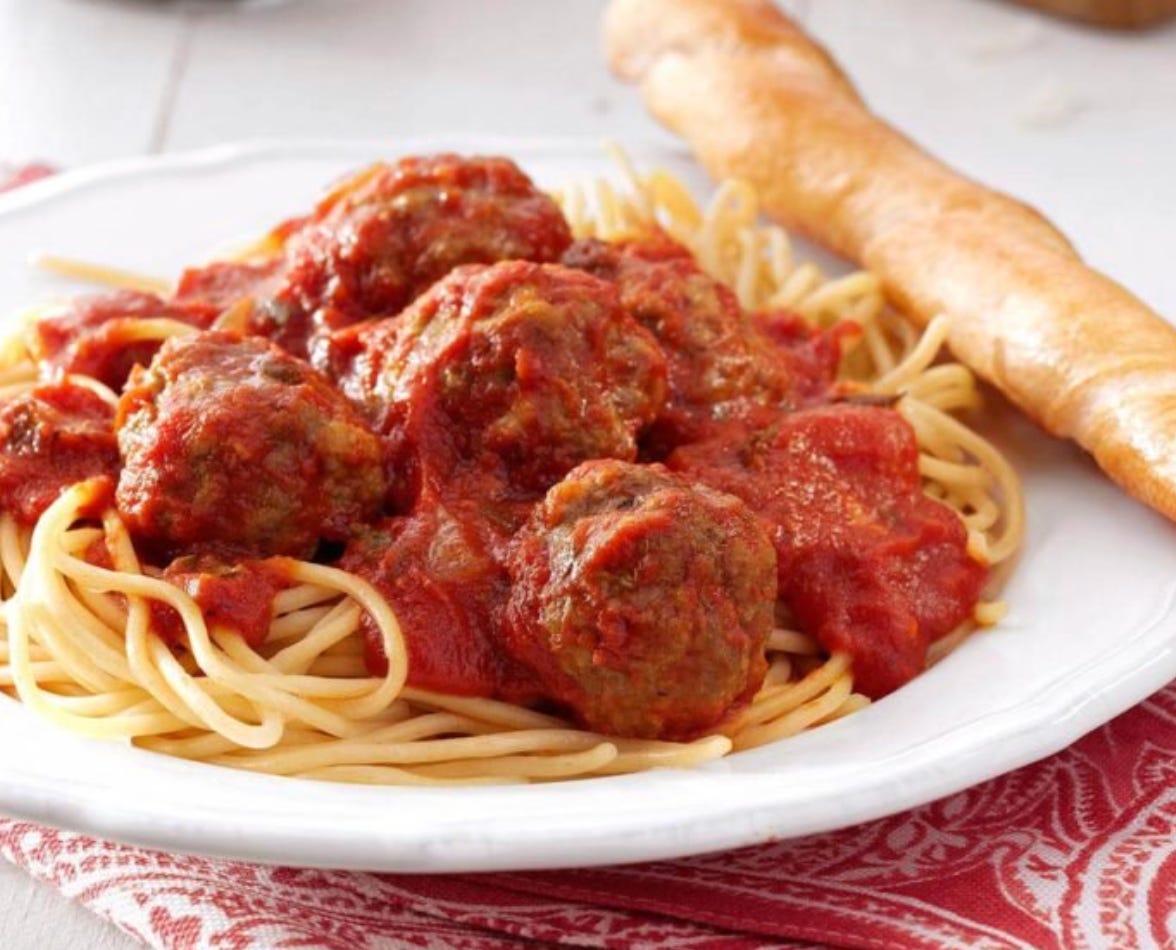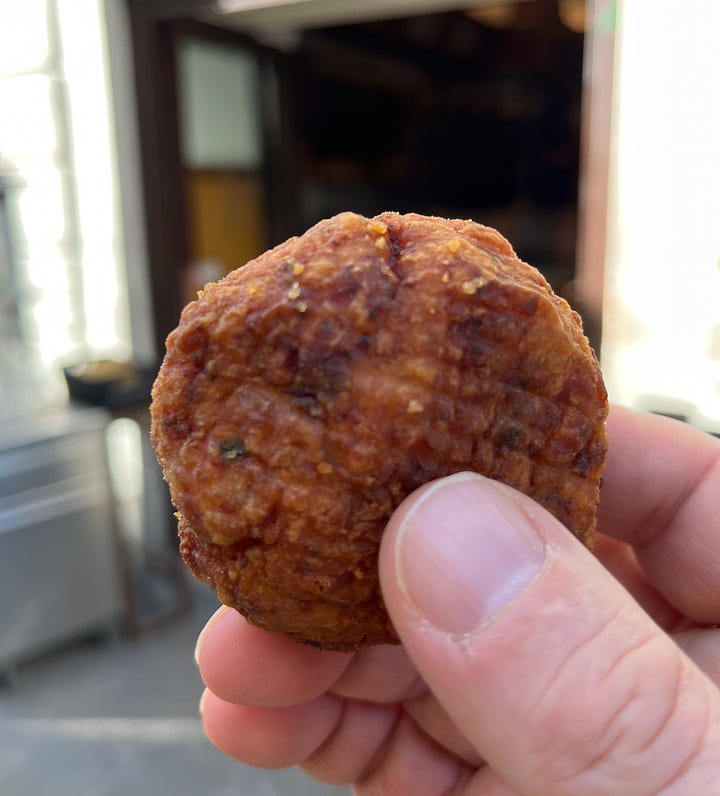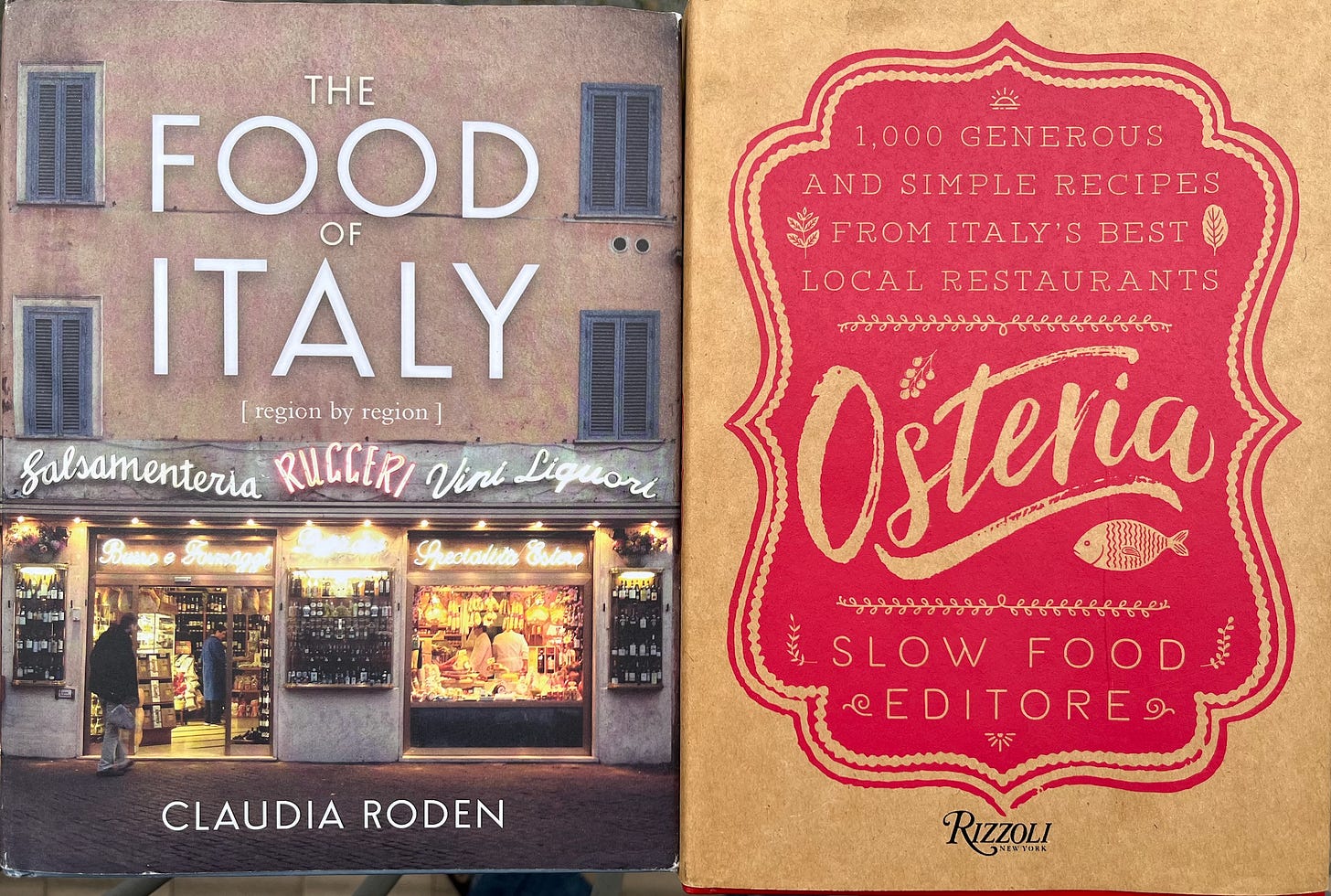Thank you for reading! I really enjoy writing these and love hearing from people who enjoy reading them. Please continue to comment, like, and share, and please know how much I appreciate all of your support.
I just got back from a week Tuscany and have a lot to share about Siena and Firenze. Right now, though, I’m going back to something that came up during the Friuli study trip.
On the first stop of our tour, my classmate-sister Teresa pointed out a bowl of grainy breadish round things and asked me if I would consider them meatballs. Would you?
As she explained, these polpette (or polpetta, but definitely not polpetti, which is octopus), translates directly to the English word “meatballs.” Except it doesn’t, because polpa means “pulp” and ette means “a smaller version.” And if you go the English-to-Italian direction, meat = “carne” and balls = “palla” or (smaller) “pallotte.” But if you plug polpette into any translation software or book, the result in English is always “meatballs.”
Full disclosure: I’m not a linguist or etymologist (people who mix up entomology and etymology bug me in ways I cannot put into words). I’ve just stumbled onto something interesting and want to share it and maybe untangle it a bit for all of us. If you have an expert (or non-expert) opinion, please share.
Polpette are balls made of something with breadcrumbs - sometimes meat, or fish, or vegetables, or just bread. They don’t focus on meat, but they may contain meat. They might not.
If you come to Italy and look for a plate of spaghetti and meatballs, you probably won’t find any. You also be hard-pressed to find polpette drenched in red sauce, although you may find some in a sauce, maybe even with a non-spaghetti pasta, but not likely with a lot of meat. If you do find spaghetti and meatballs with red sauce, on one plate — please let me know where! — it will most likely have been bounced from the US back to Italy to satisfy American tourists.

In Italy, polpette are croquettes or gnocchi or gnudi, except they aren’t really any of those. Croquettes (from France) or croquetas (from Spain) contain a soft filling breaded with, um, breadcrumbs, and then deep-fried. Gnocchi (of course Italian) consist of ingredients you’d find in polpette, but you boil them. Gnudi (again Italian) means “naked,” and are basically ravioli without a pasta shell (naked, get it?), and are also boiled. Dumplings…okay, now we’re getting really broad, because dumplings (the direct translation of gnocchi to English, by the way) comprise the entire category of cooked dough, possible around a filling, which covers all of the above, plus lots more from all over the world.
Italian home cooks make polpette with finely chopped bits of leftovers, so they can contain meat — but usually much more breadcrumbs than meat — or vegetables or fish, or just breadcrumbs. They can be deep-fried, sautéed, or baked.
The (possibly dubious) origin story of the meaty-balls recounts that meat has in the past been a rarity in Italy, so people made due with what they had, and polpette served the honorable purpose of using every little bit of everything. When Italians immigrated to America, their food dollars stretched further to reach larger quantities of readily available meat, and those Italian-Americans applied a go-big-or-go-home mentality and reversed the ratio to make enormous balls of lots-of-meat-with-a-few-breadcrumbs.
By the way, if you’re paying attention to what’s happening outside, the Italians that are now well-loved threads in the complex fabric of American culture were once reviled. In the late 19th century, large waves of Italians arrived in the US, speaking a strange language and eating strange food and being Catholic in a Protestant-heavy country. They settled into jobs left empty by the devastating Civil War, many that current citizens didn’t want to do like working in mines and factories, but were accused of stealing jobs from Americans and taking advantage of our country’s generosity. Sound familiar?
Okay, so off to the cookbooks…
I brought two (big, heavy) cookbooks to Italy, and refer to them constantly. Claudia Roden includes exactly one polpette, a Tuscan recipe for Polpette alla Fiorentina, which translates to Florentine Meatballs, but her English title is Meat or Chicken Croquettes. She notes, “Every region in Italy has its own special croquettes made with left-over boiled meats. These are especially soft and creamy inside.” That’s because they’re made with potatoes, meat, eggs, and breadcrumbs, and then rolled in more breadcrumbs and fried in hot oil. You know, like a croquette…thanks, Claudia. (I will still be making these sometime, regardless.)
Osteria, on the other hand, lists 16 separate recipes for Meatballs/”Meatballs,” the quotation marks designating those that are not made with meat, although several use fish, which I understand some people consider to be meat. The recipe for Large Meatballs, from Sa Piola della Vecchia Trattoria in Cagliari, Sardegna, names them Bombas cun Bagna, which would translate to “little bombs with sauce.” They’re made with beef, pork, and chicken, as well as eggs, breadcrumbs, and grated cheese, not breaded, then pan-fried to a golden brown crust and further cooked in a tomato sauce, and served with no pasta. This dish is not listed on the Sa Piola website, but they currently offer Polpettine di Bue Rosso al Vermentino (Red Ox Meatballs in Wine), made from beef, eggs, wine, and breadcrumbs. The rest of the menu looks extraordinary.
Pallotte cac’ e Ove (Vegetarian “Meatballs”) from Hostaria Del Pavonne in Vasto, are purely vegetarian. First you soak stale bread in milk, then squeeze it dry and crumble it with grated cheese garlic, pepper, and eggs. After letting the mixture sit overnight, you form it into balls, flatten them, and then pan fry them.
You could easily add those bits of meat or veggies or whatever if you like. They’ll probably look something like these, from Trattoria da Giovanni in Trieste:


But the recipe is restaurant size, using four cups of grated cheese, and I’m going to have to work a bit to make it more manageable.
Stay tuned.
###






Whew!!
Enjoying your food adventures! For some reason I am hungry now